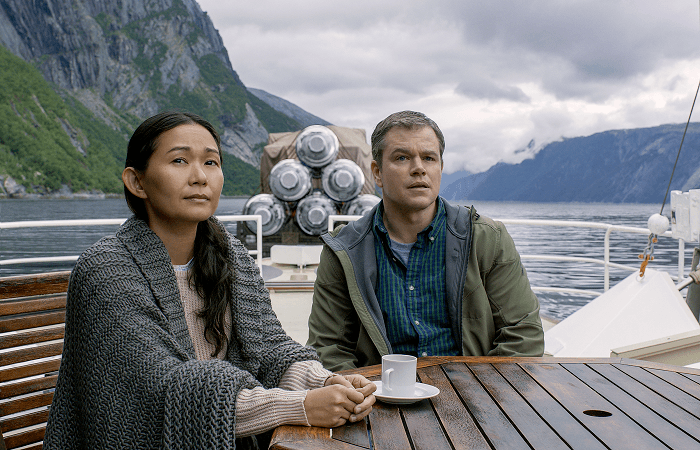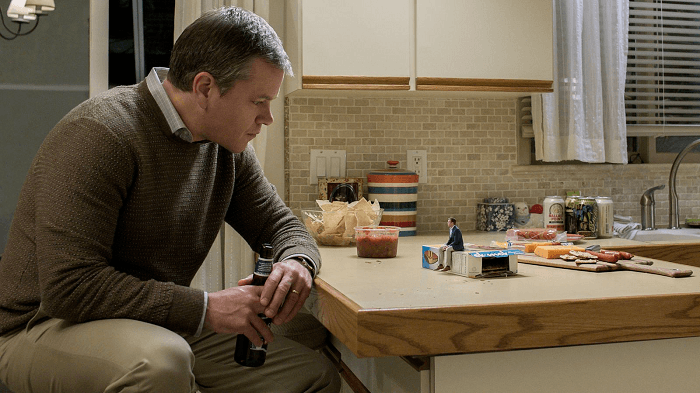It’s hard to place a finger on what Downsizing, Paramount Pictures’ new sci-fi-meets-inspirational film, means to do. It’s partly satire, without a clear message; partly end-of-the-world, without an apocalypse; partly a story of finding yourself, loving yourself, learning that you were enough all along… only to have its inspiration sullied under the treatment of the woman whose work makes it possible, the symbolic beast of burden who is both the emotional laborer and the punchline. It took a full day before I settled with my feelings on Downsizing as I sifted through the muck of what the film attempts to do, and came to believe its attempt at an inspirational story of personal growth in the context of its sci-fi theme is nothing short of clever. The problem with Downsizing, aside from the yoga pose Matt Damon used to allow both feet in his mouth the entirety of its press tour, is that goal is muddled with shifting focuses, fleeting characters, and cringe-worthy use of its main woman character.
The premise, though, is something special: in response to climate change, an institute in Norway is finally successful in its solution of cellular miniaturization, the ability to shrink organic life to mitigate their carbon footprint and collective damage to the planet. Climate change is one of a few themes important to the film that serve a functional purpose without much exploration, like grabbing a hex key to assemble your furniture only to swap it for a better size until you need it again when the work is almost done. A decade after the invention of downsizing, Paul Safranek, played by Damon, becomes interested in the voluntary procedure for the same reason most others are, which is to restart their lives. A fresh financial start, a new home in a new community – to downsize is to press the reset button and essentially start anew, as told through two old classmates who were some of the earliest downsizers, a married couple played by Jason Sudeikis and Maribeth Monroe. Their life represents what Paul wants for his, the idealized and romanticized vision of what it could mean for his poor finances, his marriage; it’s enough to make Paul and his wife, played by Kristen Wiig, the safe and simple couple, apprehensively make the decision to downsize. When Paul says, “see you on the other side,” and walks down the hospital hallway, he’s unknowingly beginning his new life alone. Sudeikis and Wiig are among the fleeting characters, those who serve their purpose briefly in a dozen or so minutes of screen time before not being seen again.

On the other side of his life, Paul spends years alone, the portrayal of a mediocre and unhappy white man who has everything but has nothing. His character is meant to be the eggshell white of people, the plain everyman, and to that end Damon succeeds as a vaguely likeable protagonist who you hope for but not exactly root for; rooting requires more passion than a character like Paul Safranek can elicit, the quintessential unremarkable man, but his good heart earns your hope for him. His life undergoes a second transformation when he meets his upstairs neighbor Dusan, played hilariously by Christoph Waltz as the hedonistic European self-proclaimed asshole who lives counter to Paul’s vanilla lifestyle. It’s through Dusan that Paul meets Ngoc Lan, a Vietnamese housekeeper with whom Paul will fall in love.
Ngoc Lan’s story comes attached with the last of the several themes that are touched on, like governmental misuse of the shrinking technology to quell dissent, and removing the veil of wealth seen in places like the miniature Leisuretown, where Paul lives, to show us that poverty also still exists for those who have downsized. Paul travels by bus with Ngoc Lan to the slums outside his world, where tenement buildings are full of the starving, poor, and disabled. People like Ngoc Lan. Only Ngoc Lan is aware the extent others are worse off than her, so she takes care of them – a good-heartedness clearly meant to spread to Paul and give his life meaning. And to some degree, Downsizing is successful here, with a few twists conjoined with climate change and that end-of-the-world hex key that was sat down and forgotten and picked back up in the third act of the film.
Actress Hong Chau is sick of talking about her character’s accent but anyone would be remiss not to mention it, being so weightily used, its impact casts a shadow of cringe or comedy over each scene. Which one – cringe or comedy – depends on the viewer. Like Jar Jar Binks’ Caribbean actor, we can pull her personal intentions from the equation to have the film stand on its own, seen for its impact, and the result is likely to make you uncomfortable at best. Chau makes for many scenes that are compelling, funny, or otherwise great in both intent and effect, though that makes up only a portion of her story; the rest include scenes that feel condescending to the character Ngoc Lan, making her as much the butt of the joke as a part of it.

Indeed, the punchline of many comedic scenes are that they’re simply spoken in broken, Vietnamese-accented English. Subtract the accent and the joke would not stand, as it would hardly exist. As I watched Downsizing it’s telling that the largest laugh from the theater audience came as Ngoc Lan was crying at a table while telling her story, as we are less meant to sympathize with her than laugh at her. Sympathy is for Paul, the mediocre man she serves to save by making him a little less so.
Overall, Downsizing feigns at many themes and embraces none, a sampler platter of personal growth, consumerism, climate change, fresh starts, and apocalypse survival. It will make you laugh, but only a little; feel compassion, but only a little; be inspired, but not enough to recommend as a movie to watch for any of what it touches on aside from the premise itself. Because that’s where its strength lies – that an institute in Norway masters the ability to shrink organic life, making you rich while less harmful to the planet. Given the chance, would you downsize your life? Should you? Your answer won’t be much affected by what Downsizing has to offer you, outside of the grand supposition itself.
Are you following Black Nerd Problems on Twitter, Facebook,Instagram, Tumblr, YouTube and Google+?



Show Comments